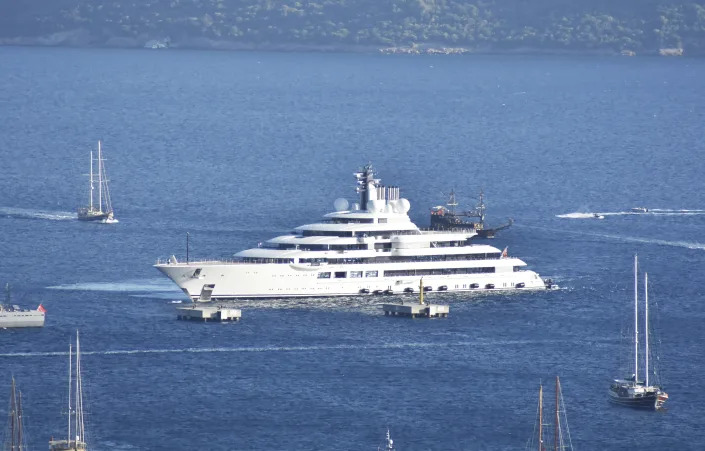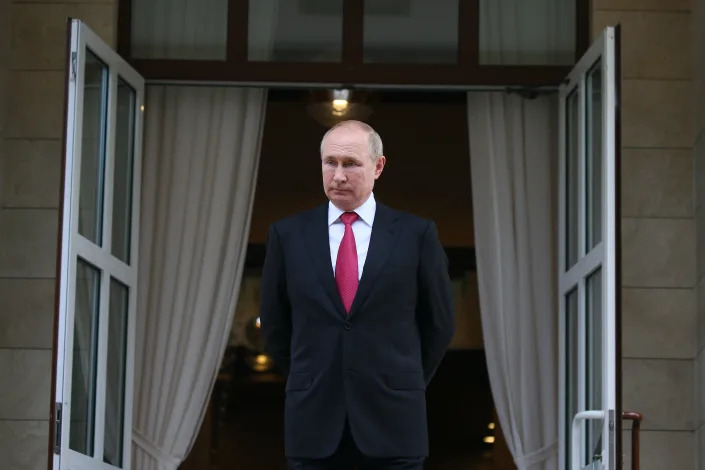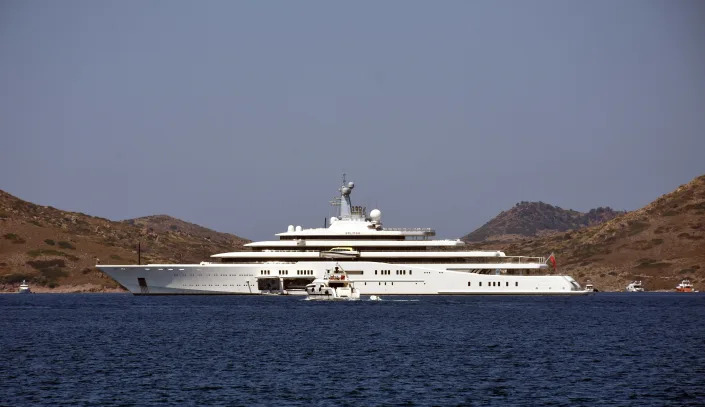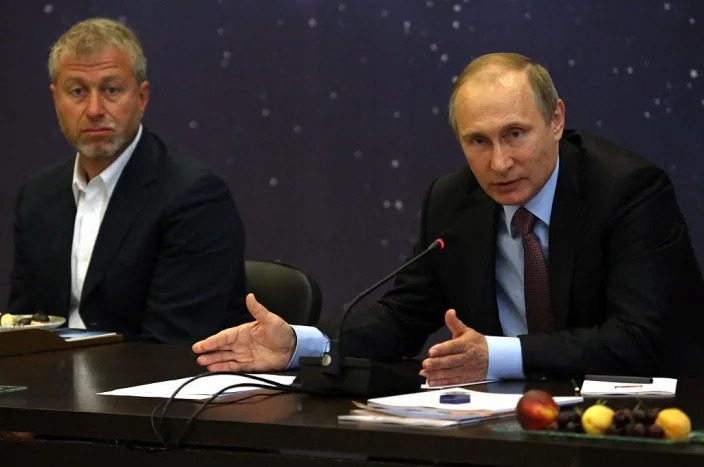Lucas Matney
Wed, March 9, 2022
The Biden White House showed off a new executive order on Wednesday regarding the regulation of cryptocurrencies. The order essentially lays out a broad strategy for how the government plans to balance consumer protection while ensuring that the United States continues to be a space for innovation in the sector.
For those in the crypto sector concerned about aggressive government intervention, the order's language seems to signal that the Biden White House is uninterested in sweeping near-term reforms and is instead merely focused on ensuring that agencies are on the same page in researching and observing the national security implications of the crypto industry.
"The rise in digital assets creates an opportunity to reinforce American leadership in the global financial system and at the technological frontier, but also has substantial implications for consumer protection, financial stability, national security, and climate risk," a fact sheet issued by the White House reads.
The press release lays out seven major goals of the executive order with added detail:
Protect U.S. Consumers, Investors, and Businesses
Protect U.S. and Global Financial Stability and Mitigate Systemic Risk
Mitigate the Illicit Finance and National Security Risks Posed by the Illicit Use of Digital Assets
Promote U.S. Leadership in Technology and Economic Competitiveness to Reinforce U.S. Leadership in the Global Financial System
Promote Equitable Access to Safe and Affordable Financial Services
Support Technological Advances and Ensure Responsible Development and Use of Digital Assets
Explore a U.S. Central Bank Digital Currency (CBDC)
While crypto investors may generally breathe a sigh of relief, fellow lawmakers like Elizabeth Warren who have been highly critical of the crypto space may be less satisfied. In recent months, Warren has criticized the industry, drawing particular attention to the environmental impacts of cryptocurrencies and the investor risks associated with lax regulation of so-called stablecoin issuers and other players in the DeFi ecosystem.
The White House's communications regarding the EO largely seems to avoid calling out any particular coins or projectsm with the exception of noting the price volatility of Bitcoin specifically. There was no mention of particular verticals like DeFi or NFTs, either.
A particular concern among some in the crypto industry was that the potential use of cryptocurrencies by wealthy Russian elite to evade sanctions would prompt a crackdown, but one unnamed senior official on a background press call seemed to downplay this possibility. "I will say, on Russia, in particular, the use of cryptocurrency we do not think is a viable workaround to the set of financial sanctions we’ve imposed across the entire Russian economy and, in particular, to its central bank."
A major focus of the order is formally directing several government agencies to begin researching the development of a state-backed cryptocurrency -- a U.S. Central Bank Digital Currency (CBDC). "This research, along with the framework we will develop for international engagement and competitiveness, will help ensure we preserve the critical role of the United States in the global financial system," a senior White House official said.
President Biden will sign the executive order today, the White House says.
WASHINGTON (AP) — President Joe Biden on Wednesday signed an executive order on government oversight of cryptocurrency that urges the Federal Reserve to explore whether the central bank should jump in and create its own digital currency.
Treasury Secretary Janet Yellen said the effort would “promote a fairer, more inclusive, and more efficient financial system" while countering illicit finance and preventing risks to financial stability and national security.
The Biden administration views the explosive popularity of cryptocurrency as an opportunity to examine the risks and benefits of digital assets, said a senior administration official who previewed the order Tuesday on the condition of anonymity, terms set by the White House.
Under the executive order, Biden also directed the Treasury Department and other federal agencies to study the impact of cryptocurrency on financial stability and national security.
Brian Deese and Jake Sullivan, Biden's top economic and national security advisers, respectively, said the order establishes the first comprehensive federal digital assets strategy for the United States.
"That will help position the U.S. to keep playing a leading role in the innovation and governance of the digital assets ecosystem at home and abroad, in a way that protects consumers, is consistent with our democratic values and advances U.S. global competitiveness," Deese and Sullivan said Wednesday in a joint statement.
The action comes as lawmakers and administration officials are increasingly voicing concern that Russia may be using cryptocurrency to avoid the impact of sanctions imposed on its banks, oligarchs and oil industry due to the invasion of Ukraine.
Last week, Democratic Sens. Elizabeth Warren, Mark Warner, and Jack Reed asked the Treasury Department to provide information on how it intends to inhibit cryptocurrency use for sanctions evasion.
The Biden administration has argued that Russia won’t be able to make up for the loss of U.S. and European business by turning to cryptocurrency. Officials said the Democratic president's order had been in the works for months before Russia's Vladimir Putin invaded Ukraine last month.
Daleep Singh, a deputy national security and economic adviser to Biden, told CNN on Wednesday that “crypto’s really not a workaround for our sanctions.”
The executive order had been widely anticipated by the finance industry, crypto traders, speculators and lawmakers who have compared the cryptocurrency market to the Wild West.
Despite the risks, the government said, surveys show that roughly 16% of adult Americans — or 40 million people — have invested in cryptocurrencies. And 43% of men age 18-29 have put their money into cryptocurrency.
Coinbase Global Inc., the largest cryptocurrency exchange in the United States, said the company had not seen a recent surge in sanctions evasion activity.
Treasury Secretary Janet Yellen said last week that “many participants in the cryptocurrency networks are subjected to anti-money laundering sanctions” and that the industry is not "completely one where things can be evaded.”
As for the Federal Reserve getting involved with digital assets, the central bank issued a paper in January that said a digital currency “would best serve the needs” of the country through a model in which banks or payment firms create accounts or digital wallets.
Some participants in digital currency welcome the idea of more government involvement with crypto.
Adam Zarazinski, CEO of Inca Digital, a crypto data company that does work for several federal agencies, said the order presents the opportunity to provide “new approaches to finance.”
“The U.S. has an interest in growing financial innovation," Zarazinksi said. He added that China and Russia were looking at crypto and building their own currency. More than 100 countries have begun or are piloting their own digital sovereign currency, according to the White House.
Katherine Dowling, general counsel for Bitwise Asset Management, a cryptocurrency asset management firm, said an executive order that provides more legal clarity on government oversight would be “a long term positive for crypto.”
But Hilary Allen, a financial regulation professor at American University, cautioned against moving too fast to embrace cryptocurrencies.
“I think crypto is a place where we should be putting the brakes on this innovation until it’s better understood,” she said. “As crypto becomes more integrated into our financial system it creates vulnerabilities not just to those who are investing in crypto but for everybody who participates in our economy.”
On Tuesday, the Treasury Department said its financial literacy arm would work to develop consumer-friendly materials to help people "make informed choices about digital assets.”
“History has shown that, without adequate safeguards, forms of private money have the potential to pose risks to consumers and the financial system,” said Nellie Liang, undersecretary for domestic finance.
Bitcoin and cryptocurrency related stocks got a boost Wednesday following Biden’s executive order.
The price of Bitcoin was up 9.8% at $42,211, according to Coindesk. Shares in cryptocurrency exchange Coinbase Global surged 9.3% in midday trading, while online brokerage Robinhood Markets rose 4.5%.
Riot Blockchain, which focuses on cryptocurrency mining, jumped 11.5%. Digital payments platforms also rose. PayPal added 4.9% and Block climbed 10.55%.
___
Associated Press writers Thalia Beaty in New York, Christopher Rugaber in Washington and Alex Veiga in Los Angeles contributed to this report.
Bitcoin: What Biden’s new law could mean for crypto investors
Brian McGleenon
Wed, March 9, 2022
Will a new digital dollar soon exist to give bitcoin a run for its money?
The Biden administration unveiled its long-awaited executive order on cryptocurrency regulation today, but what does it mean for investors?
The new order instructs agencies to officially recognise and regulate digital assets in the US.
It also tasks the US government to review the technological infrastructure needed to roll out a central bank digital currency, or 'digital dollar'.
The US is currently lagging behind China in this respect after Beijing showcased the use of its 'digital yuan' at this year's Winter Olympics.
The "Executive Order on Ensuring Responsible Innovation in Digital Assets" was signed by President Joe Biden today.
But, what does this "whole government strategy on digital assets" mean for investors in the cryptocurrency space?
Read more: 'Crypto lobby groups are dictating terms in Washington'
There has been a rapid expansion of cryptocurrencies across the globe, with the latest update being Wednesday's bitcoin (BTC-USD) legalisation in war-torn Ukraine.
In light of this, the US government's executive order is a strong signal that the crypto-sector is not going to go away any time soon.
The executive order stresses the need to facilitate the responsible development of the cryptocurrency industry, whilst "combating illicit exploitation, and reducing negative climate impacts".
An immediate reaction by many investors to the news that the Biden administration was about to issue a crypto executive order would have been panic and fear of a regulatory shutdown.
However, the details of the order convey an enthusiasm on the part of the US government to learn about the industry and make America a leader in its development.
In a statement released yesterday by US Secretary of the Treasury Janet Yellen said that “under the executive order the Treasury will partner with interagency colleagues to produce a report on the future of money and payment systems".
Watch: Economist Steve Hanke on crypdigto-lobbyists

Analysts have studied the order and the statement by Yellen and suggested it has lessened fears among crypto investors that the Biden administration would take a hard stance on the evolving crypto sector.
This has helped boost the price of key cryptocurrencies today, with bitcoin (BTC) hiking to above $42,000.
Read more: Club for women in crypto promises to close gender funding gap
According to Rebecca Retting, general counselor for Aave, president Biden’s executive ordrer represents a landmark moment for the web3 ecosystem. Speaking to Yahoo Finance she said: "The recognition by the United States government that web3 constitutes the next generation of the internet. This order signals a long-term commitment by the White House to support the industry and bring the US into a leadership position in this space."
"The Web3 industry is committed to collaborating with and working responsibly with policymakers, agencies and regulators as they respond to the order’s research directives, to ensure that the US makes sound Web3 policy that is able to evolve with the ecosystem."
It is historic that the order comes at the same time Web3 infrastructure is being leveraged to support Ukraine in its current crisis in myriad ways – a sign of the expansive promise of this technology and the ways it can enhance all aspects of our world."
According to many leading proponents of cryptocurrency, such as MicroStrategy's Michael Saylor, the US regulatory interest is welcomed.
Read more: Crypto live prices
Saylor maintains that widespread adoption of cryptocurrencies such as bitcoin will only take place when the industry has "clear crypto regulations".
Speaking to CNBC Saylor said: "Additional regulatory clarity from the Biden administration is going to benefit bitcoin and accelerate institutional adoption of that asset."
The executive order raises lots of questions, such as will stablecoins be shut down with the development of a Federal Reserve issued 'digital dollar'?
There are no specifics as yet as the order is the first step in a comprehensive study by the US government in cryptocurrencies, NFTs and decentralised finance.
The White House fact sheet claims that "surveys suggest that around 16% of adult Americans have invested in, traded, or used cryptocurrencies", now the Biden administration wants to overhaul how the nascent industry is regulated.
With the new executive order, the Biden administration wishes to protect US consumers, investors, and businesses from "any systemic financial risks posed by digital assets".
It also proposes a Financial Stability Oversight Council to bring some clarity and order to the rapidly developing cryptocurrency sector.
The White House document states a need to "identify and mitigate economy-wide financial risks posed by digital assets and to develop appropriate policy recommendations to address any regulatory gaps".
The new order recognises the need for the US to "drive innovation and maintain competitiveness" in the sector.
The US Treasury Department has been tasked with producing a "future of money and payment systems" with significant urgent development of a US central bank digital currency, CBDC.






